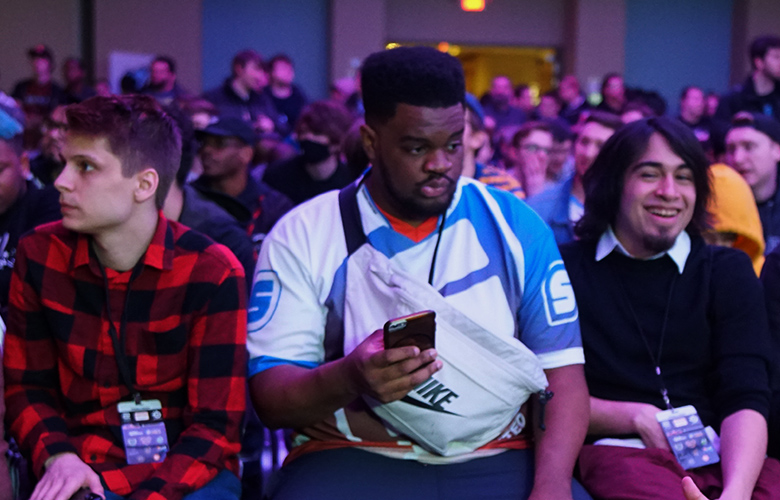
The challenge of getting audiences to the theatre is as old as theatre itself. But for smaller companies, it can seem downright impossible. Which begs the question, why aren’t independent theatres more willing to collaborate with the audience?
Audiences have always been a tricky business.
Especially for indie theatre groups.
Which means they’ve got to work at getting bums on seats.
This “work” usually takes the form of pumping out promo material like flyers, newsletters, Facebook posts and YouTube videos.
All done in the hope of generating ticket sales.
At the end of the day, do people really care what’s going on behind the scenes of a show they have no active interest in?
And if most of the stuff being distributed goes unread, unwatched and unnoticed, then what’s the point?
It makes me wonder if there’s not a better way.
Traditionally, the audience has been positioned as separate to the creative journey, coming in only at the very end of the process.
In fact, this idea is so entrenched in the way theatre’s created, it’s almost impossible to entertain doing it differently.
Several years ago, Vikki Heywood of the Royal Shakespeare Company shared an interesting story.
She said that at one point during her tenure as executive director, she and her core team had considered holding an open meeting to ask the RSC audience what they wanted.
But these meetings never went ahead.
The reason?
And so they stuck with their autocratic “we’ll decide what you watch” approach.
But what would have happened if they’d gone ahead and made the audience part of the decision-making process?
How exactly would that have looked?
Before delving any further, it’s important to acknowledge that clearly the RSC isn’t a small-scale theatre company. There are several major advantages they have over your average run-of-the-mill group. These include:
So, yes, I know I’m comparing apples and oranges.
All the same, why don’t we jump in and see if our hypothetical meeting provides any insights for smaller groups.
So, let’s imagine the RSC decided to go ahead with their audience meeting.
The big day arrives.
The RSC are nervous. Those in attendance are nervous. No-one knows what to expect.
Vikki stands up and explains the purpose of the meeting.
The RSC, she tells the gathering, want to explore the possibility of democratising their approach to theatre.
In other words, rather than passive recipients, the audience are to become co-creators involved from the very beginning.
Which means helping to decide the plays that go on.
Silence.
Finally, someone raises their hand and asks the question on everyone’s lips.
How exactly will this work?
Does each person in the audience put forward a suggestion?
Can they choose anything they like?
Does it go to a vote?
Who makes the final decision?
Confusion reigns as the audience quickly become uncomfortable at this new found shift of responsibility.
And before it’s even out of the starting gate, the practical application of collaboration looks to have fallen flat on its ass.
Obviously such an open-ended approach wouldn’t work.
Not for the RSC.
And definitely not for an independent theatre company with an even vaster slate of possibilities.
So, let’s outline a fairly simple process that could be applied to such an approach.
Like anything in life, an endless array of choice is no choice at all. This means there has to be a curated list for the audience to choose from.
A list of plays would be the most obvious way to go.
But the theatre company could also put forward a selection of playwrights, genres or even themes.
The beauty of this is it allows theatres to control the overall vision, whilst providing the audience with a voice around specific choices.
Most likely there will be choices the audience are not familiar with. Giving them access to further information is therefore important.
The problem is, however, that undertaking research is time consuming.
And not terribly interesting if it’s in written form.
To make it easier, creative teams could put together short videos explaining the different plays, writers or styles on offer.
On the surface, this seems like a lot of work.
And it is.
But it’s also creating a platform that will generate interest far more effectively than promo material at the back end.
Because the content has been made to educate rather than to sell.
And as any marketer worth their salt will tell you, this is the key to engagement.
So, once the audience have seen the list and educated themselves, the next step is casting their vote.
Here, simplicity is the key.
Which means providing online access.
Some apps that could be used include:
Crowdsignal
Surveymonkey
Poll Everywhere
Check Market
All provide a stream-lined approach to polling and should only take a few minutes to complete.
The last step (which is actually closer to the first step) is to give those who vote the chance to win something.
Free tickets being the best most obvious way to go, but really anything that creates an incentive for people to participate is worth considering.
This question, in all likelihood, is what provoked the RSC to abandon their initial idea.
Why go to all this trouble?
Wouldn’t it be easier to just keep things as they are?
The creators create.
The audience watch.
Everyone knows their place in the theatrical scheme of things.
Well yes, of course it’s easier.
But things are different today.
Audiences now have a multitude of entertainment options available at their fingertips.
But none offer viewers the chance to curate content.
Theatres, by continuing to dictate what people see are missing a golden opportunity to separate themselves from every other medium.
Their aim should be to become something that genuinely belongs to those sitting in the bleachers.
Something viewers feel emotionally connected to because THEY have played an active role in its creation.
Something the audience feels a personal sense of responsibility toward.
And by generating that sense of ownership, people will want to see the shows in a way that no amount of generic social media posts or YouTube videos could ever inspire.
The Importance of An Authentic Theatre


Michael Walker has worked as an actor, writer and director in Japan, Australia, the UK and the US. His acting credits include commercials, television shows and feature films. He was also the founder of maidenagoya, Nagoya’s first foreign-led, independent theatre company. Amongst the numerous shows he directed was Martin Sherman’s Bent, and a bilingual version of Romeo & Juliet, which toured Tokyo after its Nagoya season. Along with his theatre work, Michael is an experienced screenwriter who has had films play at festivals around the world. He is currently living in Tokyo and is the Artistic Director of Sheepdog Theatre.
Read Full Profile© 2021 TheatreArtLife. All rights reserved.

Thank you so much for reading, but you have now reached your free article limit for this month.
Our contributors are currently writing more articles for you to enjoy.
To keep reading, all you have to do is become a subscriber and then you can read unlimited articles anytime.
Your investment will help us continue to ignite connections across the globe in live entertainment and build this community for industry professionals.